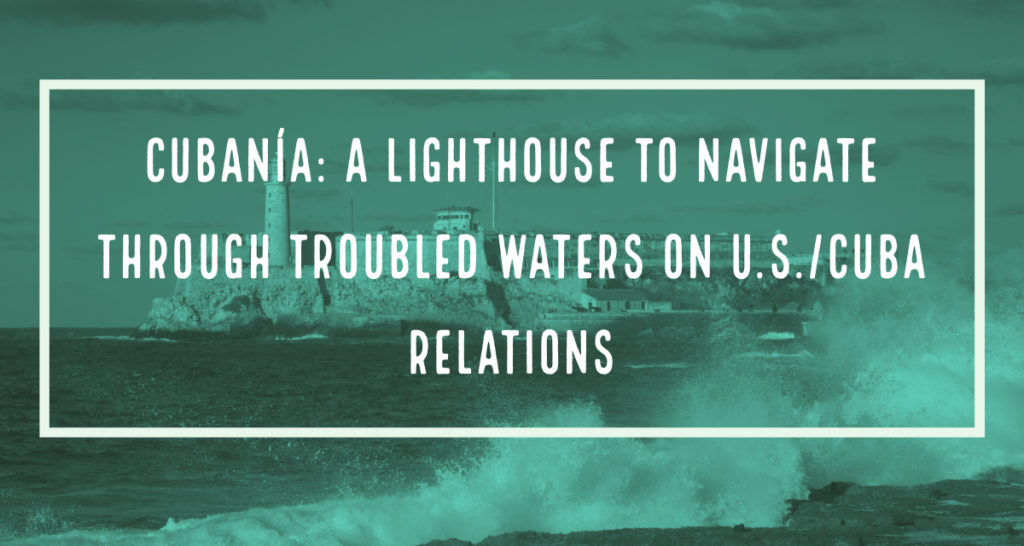Cubanía: A Lighthouse to Navigate through Troubled Waters on U.S./Cuba Relations
The Reverend Rev. Dr. Leslie Copeland-Tune, Director of the Ecumenical Advocacy Days, started a recent sermon with the statement, “Saints, we are in trouble.” She expressed that, indeed, as we listen to the news or go to our newsfeeds on social media, there is no doubt that trouble is all around us. Our faith teaches us that trouble does not “last always,” nor does it have the final say in our lives. Copeland-Tune also said that we need to gather – believing that everybody can be a part of the solution for the troubles we face in our communities, nation, and world.
I cannot think of a better way to talk about the Global Ministries workshop at Ecumenical Advocacy Days on U.S./Cuba relations. It is, indeed, a time of trouble regarding matters between the two countries. The U.S. Embassy in Havana was downgraded and no longer issues visas to Cubans to visit their families in the U.S. The economic blockade is entering into new developments by targeting the Cuban government for being supportive of the Bolivarian Revolution in Venezuela. Nevertheless, the “cubanía,” (the “cubanness”) as some anthropologists like Fernando Ortiz call it, allow us to understand the deep experience that looks to meet God in daily realities and searches for meaning and cohesion within the wide Cuban community, both on the island and in U.S. mainland.
On the afternoon of April 6th, 2019, two Cuban women – pastors serving in different contexts – met to engage in dialogue to “build bridges and end the embargo” as they navigate “the troubled waters of U.S. Cuban relations.” Reverend Yodalis Santiago, from the Free Evangelical Church in Cuba and Province Coordinator of the Cuban Council of Churches in Matanzas, talked about the direct impact of the economic blockade against Cuban families on the island. The scarcity of food products, clothing, medicines, and provisions as a direct consequence of the blockade do not affect the political stances of the people on the island. Instead, the blockade showed up as an unfair burden to the “gente de a pie” (the common people) in Cuba. Pastor Yodalis was very emphatic to say that the problems between the governments are one thing, but another thing is the reality among the peoples of the countries. As a frequent traveler to the U.S., Pastor Yodalis could testify to the love of the people of the U.S. towards her, her family, and her country. Now, she fears that as the multiple-year visa is no longer available for her, she won’t be able to visit her brothers in the U.S.
The Reverend Miriam Oropesa Gentle, a Christian Church (Disciples of Christ) Cuban American Pastor serving in Washington D.C. described her own story of pain. Her father died in the Bay of Pigs invasion to Cuba in 1961, fighting against the Cuban Revolution. She grew up with all of the awful stories carried on by the Cuban-American community in Miami and their frustrations of not being able to go back into their country. She believed what their friends and family said to her about their side of the story. However, as she grew up affirming her language, her culture, her personality, and her identity as a Cuban, she realized that there was a need to connect with her people. She realized that she needed to advocate for the people of Cuba so families could be together and the population wouldn’t continue to suffer the consequences of a senseless Cold War conflict between governments. As she participated in a People-to-People Pilgrimage to Cuba, she then realized that the island was also “her island” as a “Cubana,” and that she could learn the other side of the story, as well as to relate with her “compatriotas” in Cuba.
Both Cuban women could embrace each other in a spirit of solidarity beyond “the two shores” (“las dos orillas”), and face the participants of the workshop in a united front – advocating for the end of the economic blockade and the need of Cuban families to be together. As Carmelo Álvarez reflected recently, in spite of people’s different political ideologies and faith comprehensions (or lack thereof), what helped maintain a unique communion and open communication was Cuba, the motherland. We could see that sense of spiritual patriotism and love for a common culture and destiny working as a lighthouse amid the troubled waters of politics and ideology.

